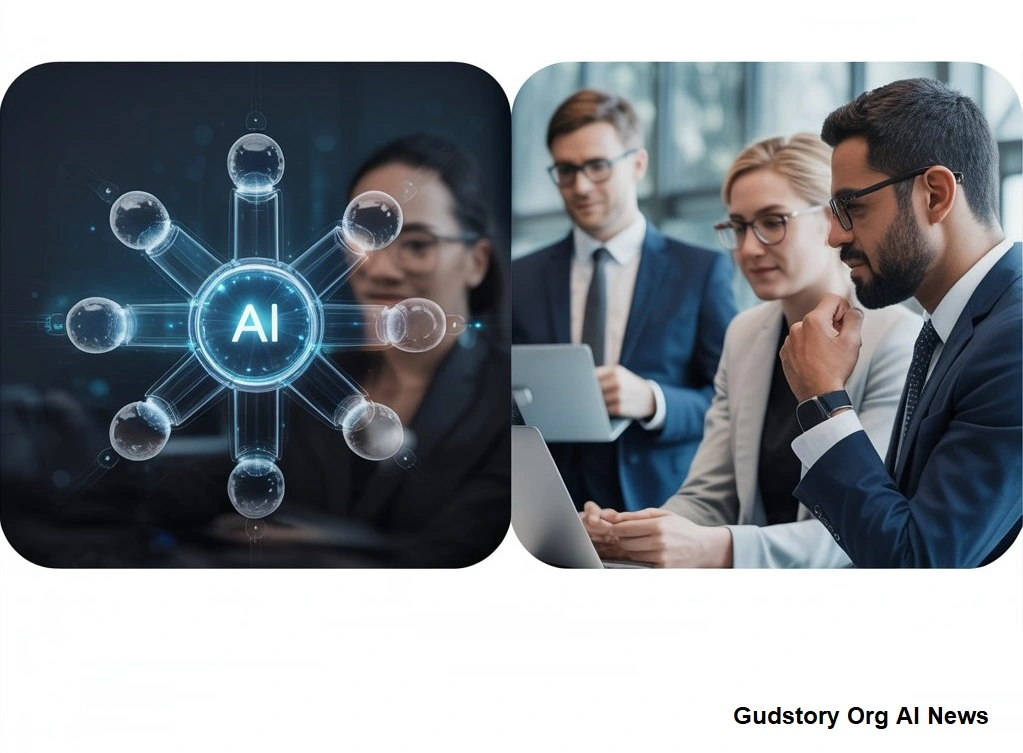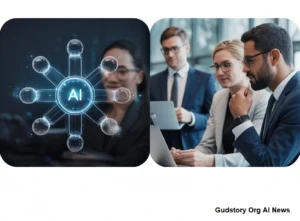AI’s Transformative Impact on Recruitment in 2025
By Gudstory Org AI News (May 26, 2025)
Thank you for reading this post, don't forget to subscribe!The hiring process is changing quickly because of the fast use of artificial intelligence (AI). What was once considered a futuristic idea has now become a vital part of modern hiring strategies. In 2025, more organizations than ever are leveraging AI in recruitment tools to streamline their hiring processes, improve candidate matching, reduce bias, and gain a competitive edge in attracting top-tier talent.
The Rise of Intelligent Recruitment Systems
Enhanced Sophistication in AI Recruiting Tools
AI in recruitment has reached new levels of sophistication. Leveraging machine learning and intelligent algorithms, these systems can now evaluate vast volumes of candidate data within seconds. Rather than depending solely on outdated methods, companies are embracing technology that offers greater precision and speed in hiring.
The shift toward AI integration addresses many of the traditional pain points recruiters have faced for years—from manually reviewing countless resumes to identifying high-potential candidates. This transformation allows hiring teams to base their decisions on data and insights rather than guesswork.
Core Functions of AI in Talent Acquisition
Smart Resume Screening: Automating the First Step
One of AI’s most influential applications is in automating resume screening. Unlike manual review processes prone to oversight and bias, AI-based systems can process thousands of applications simultaneously. These tools detect not only keywords but also understand context, relevance, and patterns from previous successful hires.
By filtering out mismatched resumes and highlighting high-potential candidates, AI streamlines early-stage hiring and ensures no qualified individual is missed due to human limitations.
AI Candidate Sourcing: Uncovering Hidden Talent
AI sourcing tools—such as Fetcher AI—are revolutionizing how recruiters discover potential employees. These platforms search job boards, social media, and professional networks to find both active and passive candidates, including those who may not be actively job hunting.
More impressively, predictive algorithms assess a candidate’s career path, availability, and openness to new opportunities. This enables recruiters to engage prospects at just the right moment, boosting hiring success rates significantly.
Conversational AI and ChatGPT: Enhancing Engagement
The adoption of conversational AI tools, including platforms like ChatGPT, has introduced new possibilities in candidate interaction. These tools manage early-stage communication, conduct preliminary interviews, and address frequently asked questions—available 24/7.
By automating these interactions, conversational AI enhances consistency and responsiveness while allowing human recruiters to concentrate on complex, high-value tasks. It leads to faster communication, higher satisfaction, and a more seamless hiring experience.
Strategic Benefits of AI in Recruitment
Accelerated Hiring Timelines
One of the biggest advantages of AI-driven recruiting is the dramatic reduction in time-to-hire. Tasks that once required weeks can now be completed in hours. AI systems can screen, rank, and shortlist candidates simultaneously—crucial for staying competitive in fast-moving job markets.
Improved Candidate Matching
AI tools excel at identifying characteristics that align with job success. By analyzing data from past hires and performance metrics, these systems can predict which candidates are likely to thrive in specific roles and organizational cultures—resulting in stronger hires and lower turnover.
Minimizing Unconscious Bias
AI’s objectivity offers a valuable counter to unconscious human bias. When designed and trained responsibly, these systems evaluate candidates based on experience and skill alone, helping companies foster diversity and inclusion through fairer hiring practices.
Insightful, Data-Driven Decisions
Modern recruitment platforms provide real-time analytics, offering a clear view of bottlenecks, candidate drop-off points, and process efficiency. These insights empower recruiters to refine their strategies continuously and make informed, evidence-backed decisions.
Navigating Challenges in AI-Driven Hiring
Despite its advantages, AI in hiring is not without hurdles. Ensuring fairness requires training algorithms on diverse data sets to prevent unintentional bias. Additionally, companies must balance automation with personal touch—candidates still appreciate authentic, human engagement during the hiring journey.
Privacy and legal compliance are other critical areas. Organizations must be transparent about data usage and ensure their systems align with employment and data protection laws.
Looking Ahead: The Future of AI in Recruitment
As AI capabilities advance, expect even greater integration in recruitment. Future tools will include enhanced natural language understanding, smarter analytics, and real-time candidate evaluation features like video and sentiment analysis.
These innovations promise even more personalized experiences and pinpoint-accurate candidate matching. Organizations that adapt early will benefit from a faster, smarter, and more inclusive hiring process.
Conclusion: Embracing the Future of AI in Talent Acquisition
AI has reshaped how companies approach recruitment—from resume screening to candidate sourcing and beyond. By adopting AI-powered hiring strategies, organizations can streamline operations, improve hiring quality, and build more diverse and competent teams.
The future of recruitment is inseparable from artificial intelligence. Companies that recognize and act on this shift today will be best equipped to attract top talent and thrive in the evolving job market of tomorrow.


